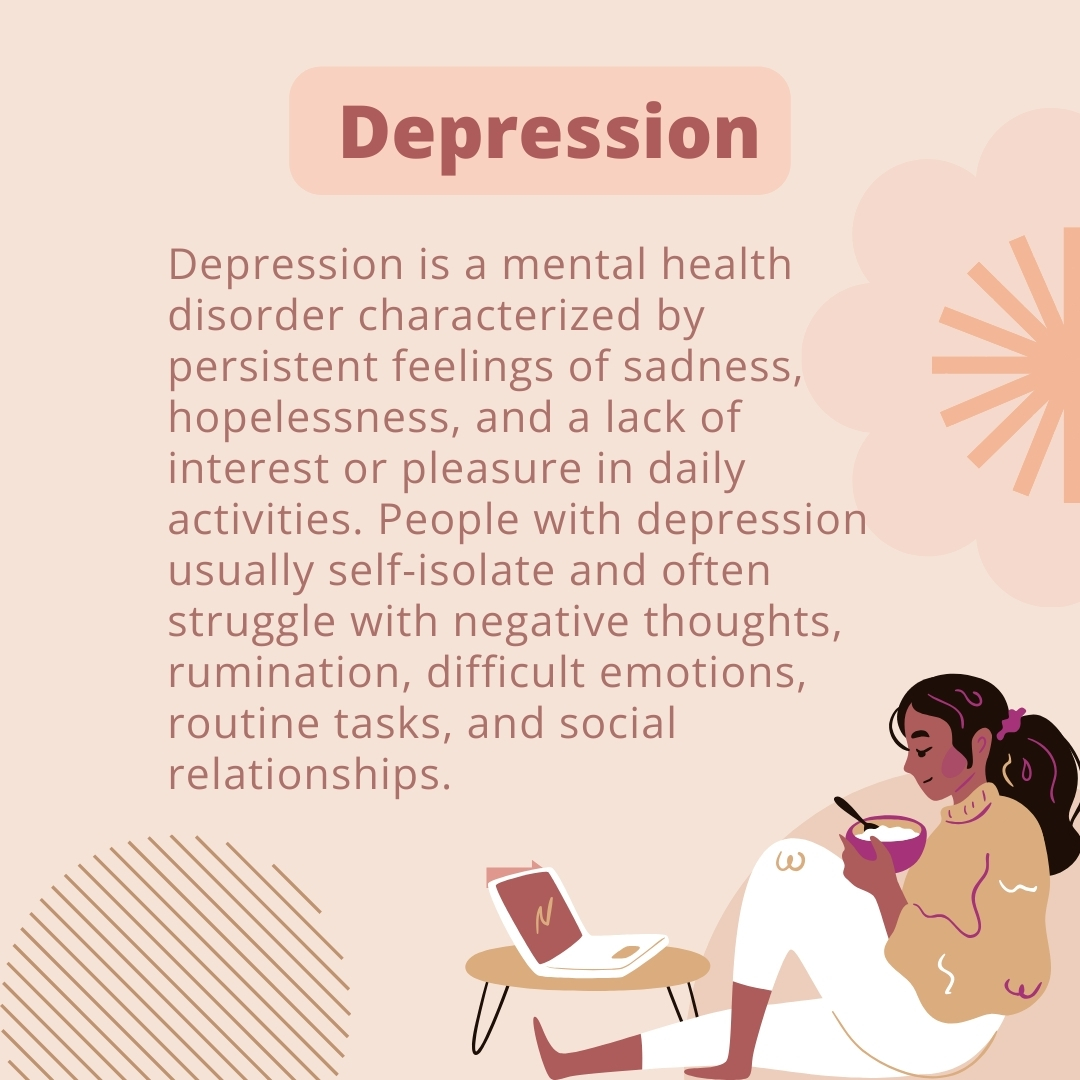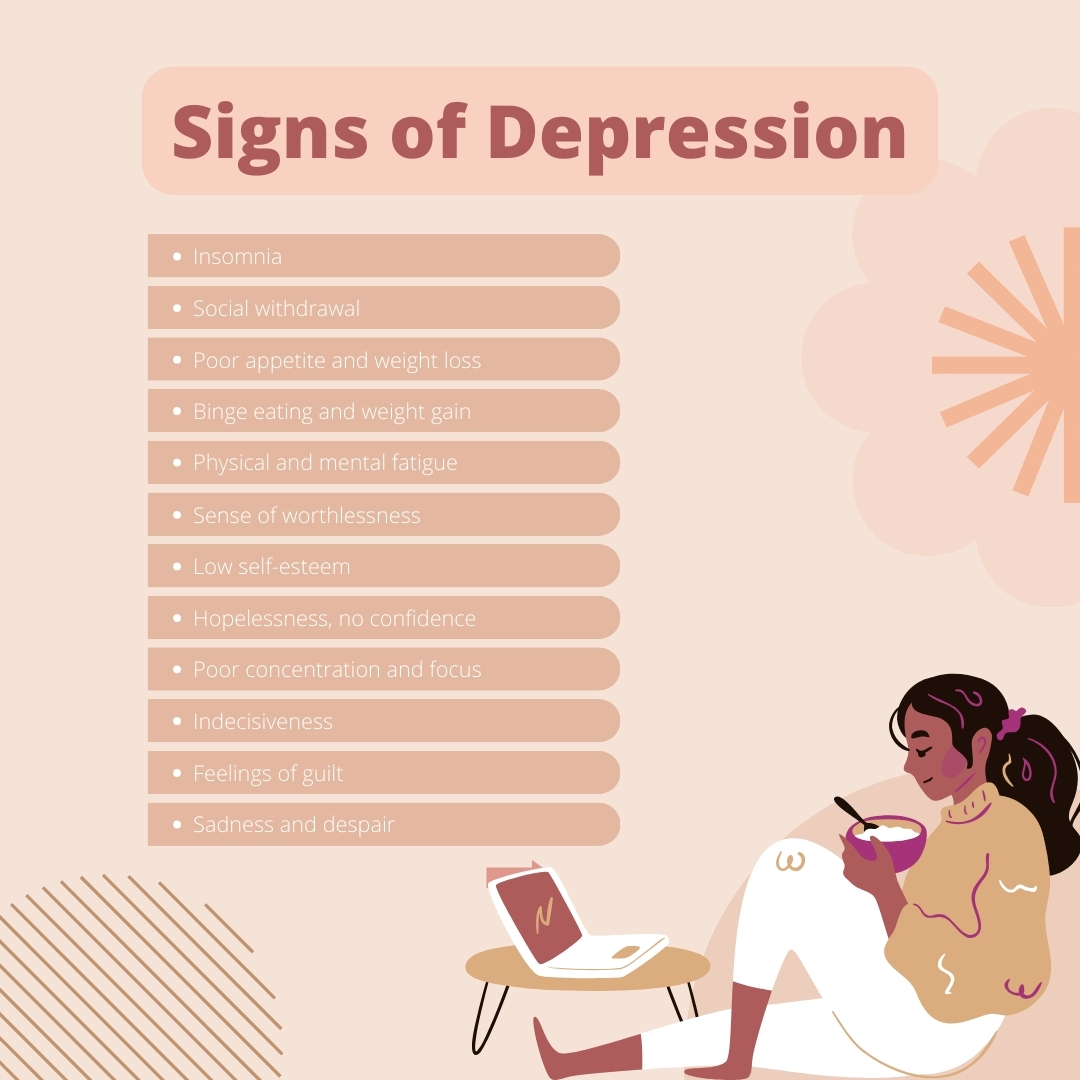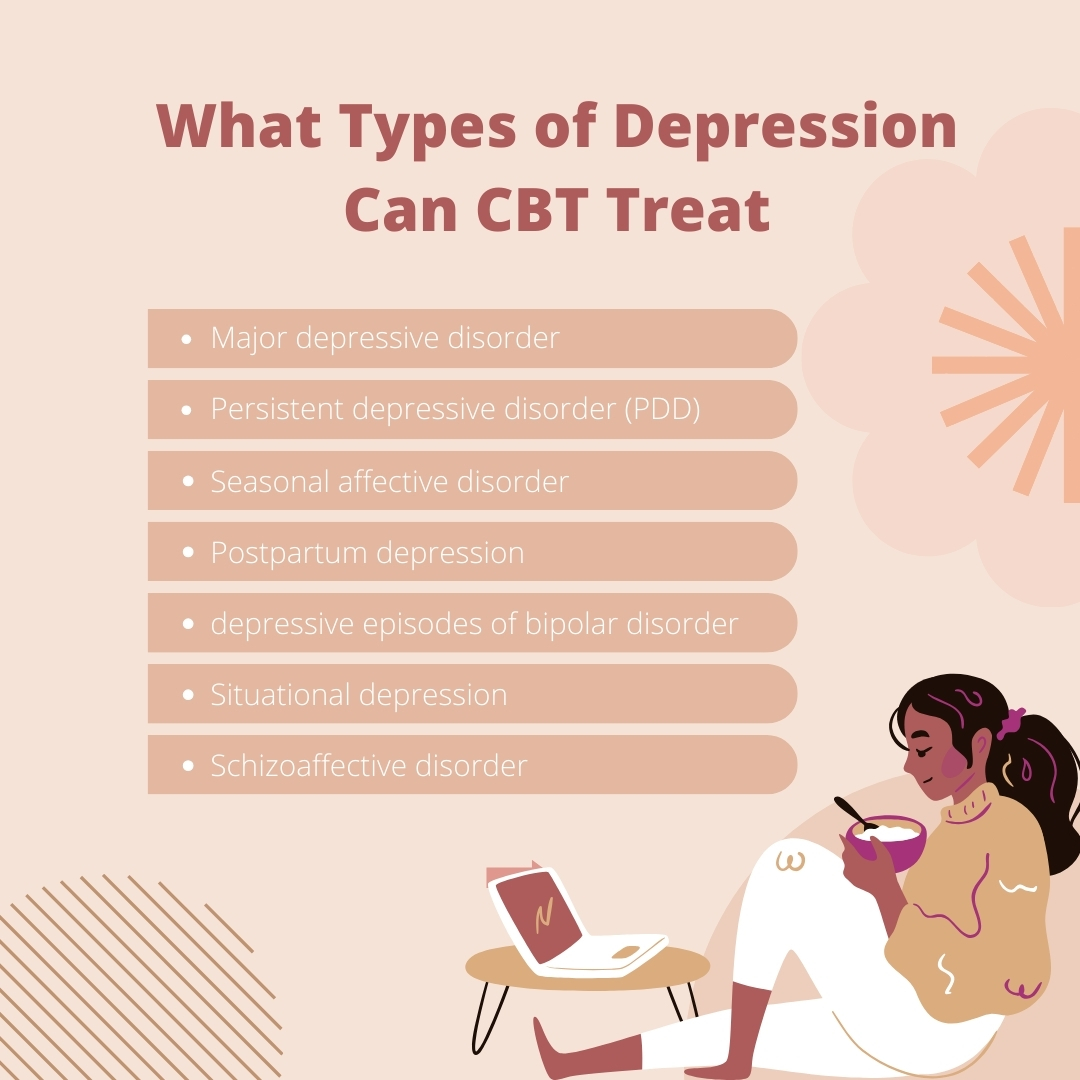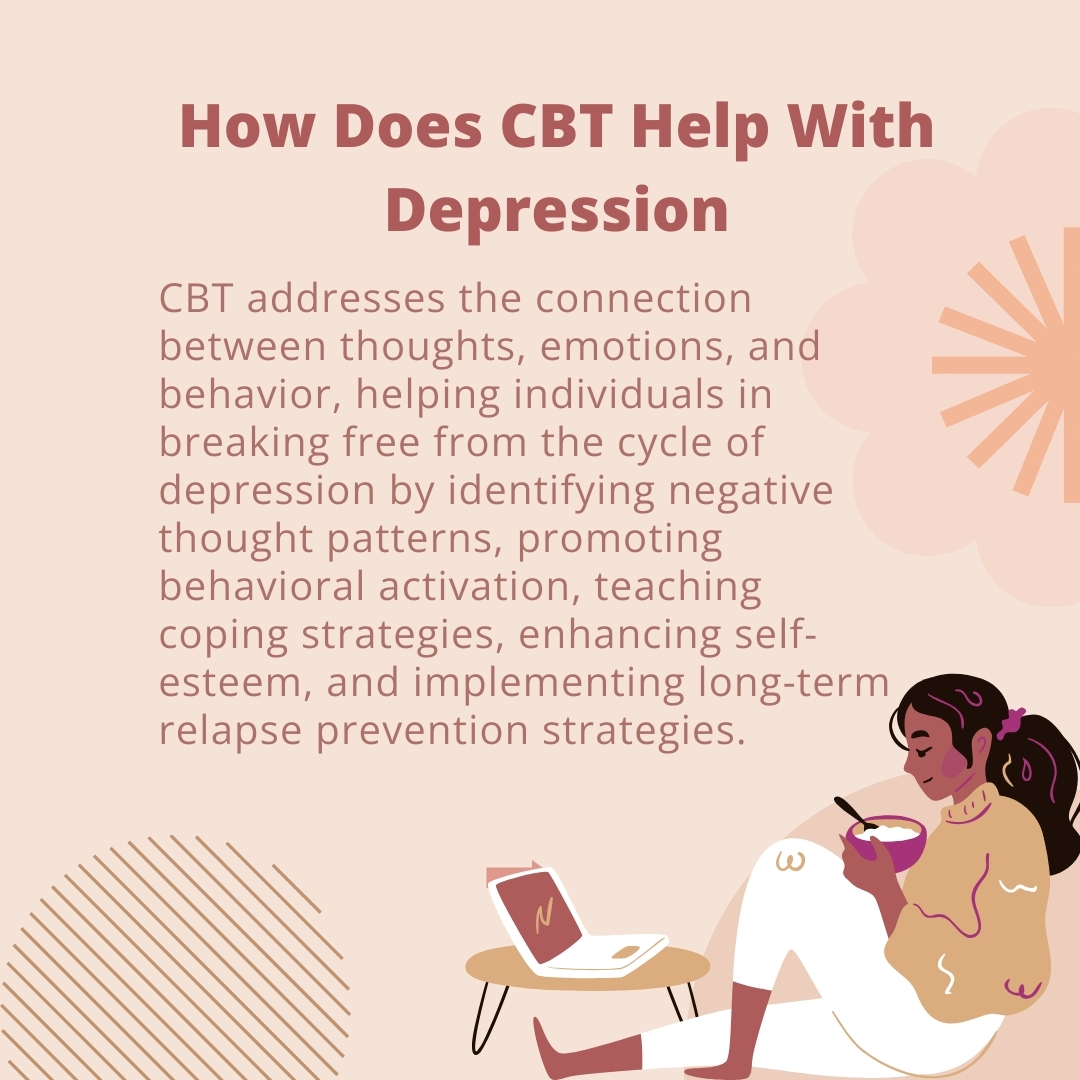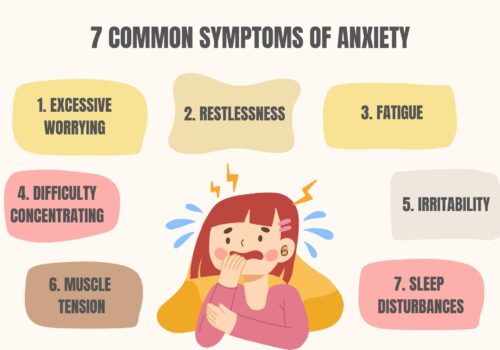CBT for depression has proved beneficial as a supporting treatment in patients who respond poorly to antidepressant therapy. Studies have demonstrated that cognitive behavioral therapy is as effective as antidepressants and psychodynamic therapy. Moreover, relapse rates are considerably reduced when CBT becomes part of depression therapy due to its long-term effects. This article will explore the benefits of cognitive behavioral therapy for depression.
What is Depression?
Depression, when it strikes, is like a dark shadow looming constantly over us, engulfing even the brightest days of our lives. According to the WHO, approximately 280 million people worldwide suffer from depression; women are 50% more affected than men. Depression isn’t an experience where you feel down or sad for a day or two. It involves a low mood that can impact someone’s energy, irritability, motivation, and general functioning ability.
Many aspects of depression are individualized and depend on the type of depression someone is experiencing. Most commonly, depression is a persistent, overwhelming sadness that lingers and affects various aspects of life. Recognizing the symptoms of depression is essential, as early intervention is often crucial to effective treatment. Fortunately, CBT has emerged as one of the most effective treatments in the battle against depression.
Common Symptoms of Depression:
- Persistent Sadness: An overwhelming sadness that comes on for no reason and doesn’t seem to end
- Loss of Interest: Lack of interest in socializing, activities, and hobbies you once enjoyed, such as hobbies, socializing, or work. You were isolating yourself from friends.
- Fatigue: Feeling constantly drained, physically, and mentally, even after a good night’s sleep.
- Poor Appetite and Weight Problems: Depression causes loss of appetite, or it could even make you overeat or binge-eat, leading to weight loss or gain
- Sleep Problems: Depression can cause insomnia or oversleeping
- Negative Thoughts: Constant negative thoughts about oneself, others, and the future.
- Poor concentration: You find it hard to focus on things or make decisions
- Physical Symptoms: Unexplained headaches or digestive issues.
- Feelings of Guilt or Worthlessness: A sense of guilt, self-blame, low self-esteem, and a feeling of worthlessness
- Suicidal Ideation: In severe cases, depression can lead to thoughts of self-harm or suicide.
Cognitive Behavioral Therapy for Depression
Cognitive behavioral therapy is based on the cognitive theory developed by Aaron Beck for anxiety and depression. Beck’s cognitive model is the core of CBT, which describes how a person’s mindset influences their feelings and behavior. It combines cognitive and behavioral therapy to target the negative beliefs and assumptions common to depression and replace them with a more realistic thought process. In CBT, patients are encouraged to tune into themselves, attempt problem-solving strategies, adopt changing behavior, and be more active during therapy. CBT is critical in helping therapists conceptualize and treat their clients’ difficulties. According to the Beck Institute, there are 14 principles of CBT, these are:
- Based on cognitive evolution and conceptualization
- A sound therapeutic relationship
- Continuous monitoring of client progress
- Culturally adapted for tailor-made treatment
- Emphasizes the positive
- Encourages collaboration and active participation
- Focuses on aspirations, values, and goals
- Focuses on the present
- Education
- Time sensitive
- Structured sessions
- Uses guided discovery to help clients respond to dysfunctional cognitions.
- Includes action plans (therapy homework)
- Utilizes a variety of techniques to change thinking, mood, and behavior
What Types of Depression Can CBT Treat?
Research has proved that CBT can be effective for a variety of depressive disorders from mild to moderate. It is also effective in severe cases of depression when combined with medication. Types of depression treated by CBT are:
- Major depressive disorder
- Persistent depressive disorder (PDD)
- Seasonal affective disorder
- Postpartum depression
- The depressive episodes of bipolar disorder
- Situational depression
- Schizoaffective disorder, depressive type
How Does CBT Help With Depression?
CBT addresses the connection between thought, emotions, and behavior, helping people break free from the cycle of depression. Here are some of the most compelling ways CBT can treat depression.
- Identifying Negative Thought Patterns: Depression fills your brain with a distorted perception of things. CBT helps identify such thought patterns and replaces them with balanced, positive, and realistic thinking.
- Behavioral Activation: CBT encourages activity, motivating you to set achievable goals and gradually enjoy life activities, which can reduce or distract you from symptoms of depression.
- Coping Strategies: CBT equips depressive people with skills to cope with depression and how to manage its symptoms. You learn to cope with stress, regulate emotions, and solve problems effectively.
- Improves Self-Esteem: CBT challenges negative self-beliefs to create a more positive and healthier opinion about yourself in your mind, increasing your self-esteem.
- Preventing Relapse: CBT isn’t just about treating depression; it implements long-term strategies to avoid relapse. Research has proved that CBT is more effective in reducing relapse times in depression, leading to longer mental well-being.
Types of CBT Techniques for Depression
Besides the standard model of cognitive behavioral therapy, there are three other sub-types of the treatment which are:
1. ACT (Acceptance & Commitment Therapy):
ACT Involves techniques to improve cognitive flexibility, thus reducing negative thoughts, self-criticism, anxiety, and judgment. It also improves concentration and focus. ACT is based on six principles with different techniques applicable to each.
- Cognitive defusion
- Expansion and Acceptance
- Contact and connection with the present moment
- The Observing Self
- Values clarification
- Committed action
2. DBT (Dialectical Behavioral Therapy)
DBT helps people to accept challenging feelings and thoughts. It aims to balance acceptance and addressing negative thoughts and behavior to help one make healthier changes and cope better with stressors. DBT was developed to treat people with suicide ideation and is frequently used for borderline personality disorder (BPD
3. Rational Emotive Behavior Therapy (REBT)
This therapy was created to help depressed people make the right choices that meet their needs to survive and feel fulfilled. It teaches individuals how to recognize and deal with irrational and unhealthy thinking to move out of the trap of depression. REBT uses several CBT techniques for therapists and those afflicted with depression.
Common CBT Techniques for Depression
Several CBT techniques are created to help people cope with various mental disorders. Plans to deal with depression are simple. Some of these are strategies adopted by therapists, while others can be directly adopted by the afflicted person or by someone supporting and helping a loved one with depression.
1. Keeping a Thought Journal
Keeping a journal to record your thoughts and moods throughout the day can help you identify patterns and triggers for depressive thoughts. Recognizing them is the first step in reframing them. Make a list of activities you used to enjoy doing and gradually reintroduce them into your daily routine. Track your progress and acknowledge your achievements, no matter how small they may seem.
2. Cognitive Restructuring
One of the main strategies of CBT, cognitive restructuring, challenges negative thinking, unhealthy thought patterns, and cognitive distortions that increase depression. Cognitive restructuring is literally what it says: restructuring your mind to form healthier habits, reduce cognitive errors, and practice ways to rationalize distortions and untrue beliefs. It induces positivity and helps calm you down.
3. Relaxation and Mindfulness
Practicing relaxation techniques like deep breathing, progressive muscle relaxation, or mindfulness meditation can help reduce anxiety and stress, common companions of depression.
4. Setting SMART Goals
Create Specific, Measurable, Achievable, Relevant, and Time-bound (SMART) goals for yourself. These goals should be realistic and tailored to your current abilities. Achieving them can boost your self-esteem and motivation.
5. Social Skills Training
Work on your social skills by slowly reconnecting with friends and family. Practice active listening, and try engaging in conversations. Social support, especially from loved ones and friends, is crucial in overcoming depression.
6. Self-Compassion
Be kind to yourself and treat yourself with the same compassion you would offer to a friend facing similar challenges. Self-criticism only worsens depression—practice self-care, which undoubtedly makes you feel good about yourself and reduces low self-esteem.
Depression might seem difficult to escape; it is challenging, but the journey is more supportive with cognitive behavioral therapy. CBT interventions for depression are a strong ally that help you recognize your condition, acknowledge it, and reach out for help and support. The treatment is certified by the Beck Institute and constantly monitored to introduce new strategies and techniques that support it. Compared to antidepressant medication, CBT alone has proved effective in continuous recovery from depression. Moreover, it shares the same efficacy as medication in treating all types of depression and is a guiding light for a brighter future.



